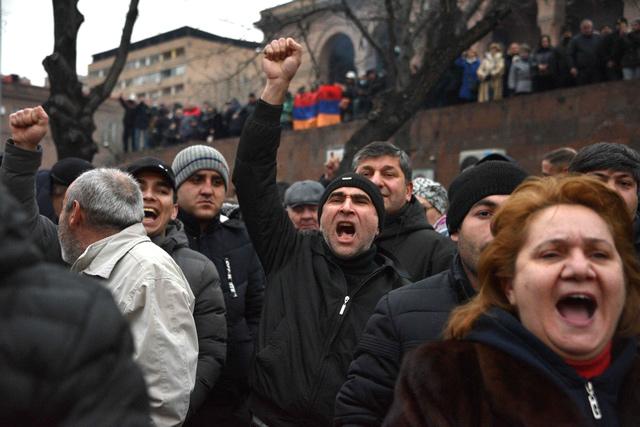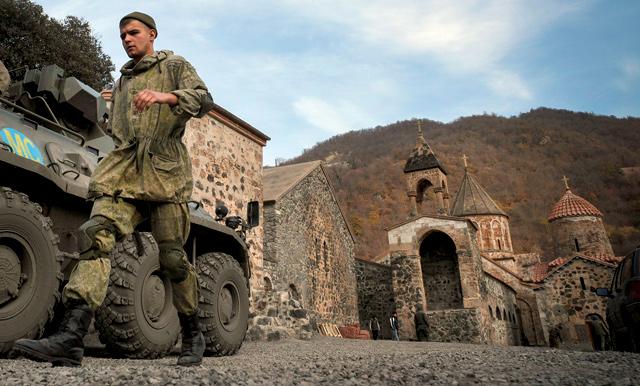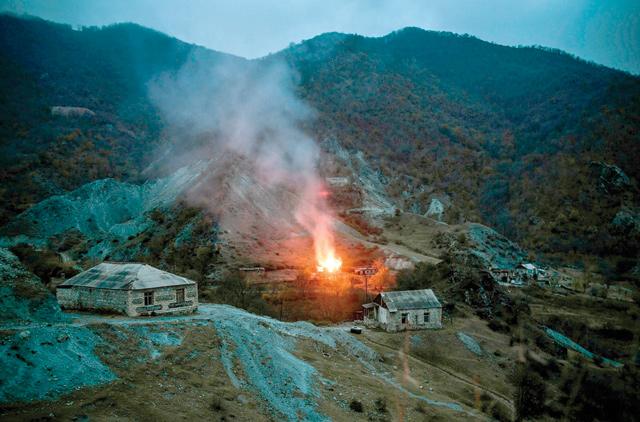You are here
Armenia PM says ready for early elections to end crisis
By AFP - Mar 01,2021 - Last updated at Mar 01,2021

Opposition supporters rally outside the national assembly building to demand Prime Minister Nikol Pashinyan’s resignation over his handling of last year’s war with Azerbaijan in Yerevan on Monday (AFP photo)
YEREVAN — Armenia’s embattled Prime Minister Nikol Pashinyan told thousands of rallying supporters on Monday that he was ready to hold early elections to bring the country out of a political crisis.
Facing fire for his handling of last year’s disastrous war with Azerbaijan, Pashinyan filled Yerevan’s central Republic Square with more than 20,000 supporters, as government opponents demonstrated outside parliament to demand his resignation.
The rival rallies came with Pashinyan under increasing pressure for his handling of the war over the disputed Nagorno-Karabakh region, which saw Armenia suffer heavy losses and agree to hand over swathes of territory to Azerbaijan.
The political uncertainty is threatening to set off a chaotic power struggle in Armenia, an impoverished ex-Soviet republic on the borders of Turkey and Iran.
“If the parliamentary opposition agrees to early elections, we will agree to early elections,” Pashinyan told the flag-waving crowd.
“Let’s go to the polls and see whose resignation the people are demanding,” said Pashinyan, who swept to power after spearheading peaceful protests in 2018.
He admitted to making mistakes and asked for forgiveness, but denounced those he said were trying to undermine the country’s democracy.
“Only the people can decide who will remain in power,” said Pashinyan, adding that old rivals are trying to undermine his government.
“We don’t want the same old leaders to come back, we elected Pashinyan and we trust him,” Narine Garibyan, a 59-year-old artist, told AFP at the rally.
“He is not guilty for what happened with the war. We are all guilty because we were silent all those years when the old leaders robbed the country and neglected the army.”
‘Sold out our land’
Several thousand pro-opposition protesters meanwhile gathered nearby outside parliament, where activists have set up a tent camp and vowed to stay until Pashinyan and his government resigns.
“We want to change those in charge — they sold out our land,” Hovsep Hovsepyan, a 65-year-old pensioner, told AFP at the protest.
“Pashinyan is the one responsible for losing the war, only him... He should go, it is a matter of honour. The people demand it.”
Monday’s rallies coincided with the anniversary of the deaths of 10 people when riot police dispersed thousands of protesters contesting the result of a presidential election in Yerevan on March 1, 2008.
President Armen Sarkisian, whose role is largely symbolic, called for all sides to show restraint on the anniversary.
“Political struggle must not go beyond the bounds of the law, it should not lead to shocks and instability,” he said in a statement.
Sarkisian has become a central figure in the crisis after he refused on Saturday to sign an order from Pashinyan to dismiss the chief of the military’s general staff Onik Gasparyan.
Pashinyan has sent the request for his dismissal back to the president and the two appear to be in a stand-off.
Last week the prime minister accused the military of attempting a coup when the general staff backed calls for his resignation.
Dispute over Russian missiles
The row with top generals began when Pashinyan fired the deputy chief of the general staff after he ridiculed claims by the prime minister that Iskander missiles supplied by Russia — Armenia’s main military ally — had failed to hit targets during the war over Nagorno Karabakh.
Pashinyan issued a retraction of sorts on Monday, with his office saying he had been “incorrectly briefed on this matter” and had no doubts about the quality of Russian military production.
Pashinyan has faced fierce criticism since he signed a Moscow-brokered peace deal over Nagorno-Karabakh, an ethnic Armenian region that broke from Azerbaijan’s control during a war in the early 1990s.
Fresh fighting broke out over the disputed territory in late September, with Azerbaijan’s forces backed by ally Turkey making steady gains.
After six weeks of clashes and bombardments that claimed around 6,000 lives, a ceasefire agreement was signed that handed over significant territory to Azerbaijan and allowed for the deployment of Russian peacekeepers.
The agreement was seen as a national humiliation for many in Armenia, but Pashinyan has said he had no choice but to agree or see his country’s forces suffer even bigger losses.
Related Articles
YEREVAN — Armenian Prime Minister Nikol Pashinyan on Monday dismissed his foreign minister as several thousand demonstrators staged a new ra
YEREVAN — Thousands of protesters rallied in the Armenian capital on Saturday in a renewed call for Prime Minister Nikol Pashinyan to resign
YEREVAN — Armenian President Armen Sarkisian said Saturday he had refused to sign a prime ministerial order to dismiss the army's chief of s













